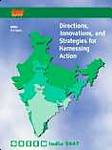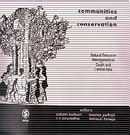|
|||||||||||
Sustainable Development
 |
Directions,
Innovations, and Strategies for Harnessing Action (DISHA) A TERI publication |
| This
book is the outcome of the second phase of the GREEN India 2047 project.
This provides a detailed picture of the impact of development on the
environment and natural resources over the next 50 years, outlines specific
elements of initiatives or actions to make that development sustainable,
and lists the major stakeholders who have to assume responsibility for
correcting the aberrations of the past so that the future can become
truly sustainable. Download the Introduction chapter (PDF) from the
website. |
|
 |
A
Century Of Hope by M S Swaminathan |
| Dr.
M.S. Swaminathan, renowned agricultural scientist, asserts in this collection
that we can be proud of the achievements of independent India in creating
self-confidence in our agricultural capability. The tasks now relate
to the total eradication of hunger and the promotion of an evergreen
revolution rooted in the principles of ecology, social and gender equality,
and employment generation. For, the concept of sustainability includes
all these dimensions. He emphasizes that frontier technologies like
biotechnology, space, communication, information and renewable energy
technologies can all be of great help in fostering sustainable advances
in agriculture. We have uncommon opportunities today for spreading an
ecology of hope movement through the integration of traditional wisdom
and modern science. Such a movement will, however, become a reality
only if principles of ethics and equity govern all areas of human endeavor.
"What we now refer to as 'medical plants' are the products of observations,
selection and conservation by tribal and rural families over several
centuries. Yet, these primary conserves of genetic material and holders
of knowledge live in poverty, while those who use their discoveries
and material in breeding and biotechnological enterprises live rich."
"Food security today is a function of purchasing power. It is best measured
in terms of million person-years of job, rather than in million tonnes
of food grains. The famine of remunerative and sustainable livelihood
opportunities, and not the non-availability of food in the market, is
the main cause of the under-and malnutrition prevailing among nearly
300 million children, women and men in the country now." |
|
 |
Environmental
Politics - People's Lives And Development Choices by Sumi Krishna |
| In
the relatively short period of two decades since the emergence of environmentalism
as an organized movemental advocacy has matured from protesting against
environmental damage to questioning the very character and course of
development. This book is an original, thought provoking and gender-sensitive
enquiry into why environmentalism has not yet had a greater impact on
people's lives or on development policy in India. |
|
 |
Social
Change Through Voluntary Action by Harsh Sethi, Pravin Visaria, M L Dantwala |
| Over
the past few decades, there has been a glaring deterioration in India's
social and political ethos. The repercussions of this process on public
behaviour are evident in all walks of life which are characterized by
apathy, cynicism and a general gloom. Bucking this general trend, the
contributions to this volume maintain that there is reason to believe
that voluntary action can be a potent instrument for bringing about
social transformation, for eliminating poverty, and for building an
egalitarian and humane society. To this end, they present convincing
examples of successful socio-economic transformation brought about by
a determined application of these ideals. |
|
 |
Eco-Pioneers
: Practical Visionaries Solving Today's Environmental Problems |
|
Lerner
has spent four years searching out what he calls "eco-pioneers"--people
who are working to reduce the pace of environmental degradation. Here
he provides case studies of eco-pioneers who are exploring sustainable
ways to log forests, grow food, save plant species, clean up cities,
conserve water, protect rivers and wildlife, treat hazardous waste,
and reduce both waste and consumption.
|
|
 |
Our
Ecological Footprint : Reducing Human Impact on the Earth by Williams E. Rees, Phil Testemale, Mathis Wackernagel [Buy this book from FirstandSecond.com] |
|
Synopsis:
"Equipped with useful charts and thought-provoking illustrations,
this book introduces a revolutionary new way to determine humanity's
impact on the Earth and presents an exciting and powerful tool for
measuring and visualizing the resources required to sustain households,
communities, regions, and nations."
|
|
 |
Sustainable
Communities : Th_blanke Potential for Eco-Neighbourhoods |
|
Synopsis:
An examination of the practicality of re-inventing neighbourhoods.
It presents the findings of a worldwide review of eco-villages and
sustainable neighbourhoods, demonstrating what is possible. The main
thrust of the book is on the ordinary localities in which people live.
It includes case studies from the UK, Denmark, Germany and the USA,
plus a detailed appendix listing eco-neighbourhoods and schemes.
|
|
 |
Eco-restructuring
- Implications For Sustainable Development by Robert U Ayres, Paul M Weaver |
| This
volume is a significant contribution to the literature or sustainability.
It identifies on a sectoral basis the critical issues facing the world
as a whole, and the technical feasibility of addressing them. A new
paradigm of eco-restructuring for sustainable development is introduced,
involving shifts in technology, economic activities, and lifestyles
needed to harmonize human activities with natural systems. |
|
 |
Pollution
Control In The South And North - A Comparative Assessment Of Environmental
Policy Approaches In India And The Netherlands O J Kuik, M V Nadkarni, F H Oosterhuis, G S Sastry, A E Akkerman |
| Environmental
pollution is a matter of concern for all countries in the world, whether
rich or poor. In an effort to address this problem, most nations have
introduced some form of environmental policy. Being a relatively new
government activity, the continuing challenge is to find a suitable
mix of policy instruments which are simultaneously effective and efficient,
equitable, administratively feasible and generally acceptable. India
and the Netherlands both have a long history of fashioning environmental
policies. Even though they have fundamentally differing starting points
- India is still in the process of industrializing while the Netherlands
is in the post-industrial phase - the authors of this book maintain
that the two countries can learn from each other's experiences. The
primary aim of this study is, accordingly, to provide an analysis of
and insights into the constraints and strengths of pollution control
instruments prevalent; in both countries and to recommend improvements
in the efficiency and effectiveness of such measures. |
|
 |
Communities
And Conservation - Natural Resource Management In South And Central
Asia by Ashish Kothari, R V Anuradha, Neema Pathak, Bansuri Taneja |
| The
introductory section provides a regional and global overview of the
need for, and conceptual and practical issues facing, community-based
conservation (CBC). The next section presents country profiles of CBC
in India, the Maldives, Mongolia, Nepal, Pakistan and Sri Lanka. The
contributors highlight the factors that either assist or hinder CBC.
The third section explores a range of emerging issues that confront
community-based conservation. These includes: The importance of institutional
structures The relevance of traditional and local knowledge The legal
and policy frameworks Gender and other equity issues Benefit-sharing
These issues are then examined in a series of case studies from India
and Sri Lanka. The case studies have been selected to represent diverse
situations such as state-controlled projects, community-controlled ones,
and those which are jointly managed. With its unique blend of theory
and practice and its wide comparative coverage in terms of issues discussed
and countries studied, this volume will be essential reading for all
those involved with environmental studies, natural resource management,
bio-diversity, ecology, community development and development studies.
It will also be of interest to policy-makers, administrators, NGOs and
donor organizations. |
|
 |
A
New Moral Economy For India's Forests? - Discourses Of Community And
Participation Roger Jeffery |
| The
book begins with a comprehensive introduction by the editors which focuses
on the concept of 'community participation' in forest conservation.
They argue that a 'new moral economy ' is in the process of being evolved.
In recognising the legitimacy of 'local' involvement, JFM policies and
strategies tend to impose new, limited rights and understand customary
claims selectively due to distorted notions of who constitutes a 'community'
and why, and what constitutes 'participation' in natural resource management.
The essays that follow take up a variety of important topics such as
examining the discourse on community participation in forest management
in a historical and conceptual framework; discussing the nature of the
'community' which is expected to participate; evaluating the possible
forms of participation; exploring the discourses that have developed
around questions of gender and class; understanding the respective roles
of the community, NGOs and the forest department in JFM; and assessing
the problems involved in 'going to scale' and developing full-fledged
projects. Overall, the contributors highlight the need for greater attention
to regional networks of power and resource use. Community participation,
they argue, must allow the local populace to choose their own methods
of conservation and not degenerate into merely another way of co-opting
villagers into the agenda of the state. Comprising original essays which
report recent research and field experiences from all over India, this
thought-provoking volume will interest those in the fields of environment
studies, forestry, economics, management, politics, human geography,
sociology, social anthropology and development studies as well as policy-makers,
bureaucrats and non-governmental organisations. |
|
 |
Living
On The Move - Bhotiyas Of The Kumaon Himalaya Vineeta Hoon |
| Using
the Bhotiyas of the Kumaon Himalaya as an example, the purpose of this
study is to show how communities practicing transhumance and nomadism
all over the world are in a state of transition. Having spent a year
living with them, Vineeta Hoon describes the traditional lifestyles
of the Bhotiyas and how, despite the intrusion of the forces of modernization,
history and global politics, they are still able to maintain their identity,
cultural values and subsistence practices. Refuting the general belief
that pastoral nomadism is environmentally destructive, the author demonstrates
that transhuman lifestyles and strategies are environmentally sensitive
ways of surviving in harsh mountain habitats. Focusing on the Bhotiyas'
traditional resource use strategies, Dr Hoon uses the systems-ecology
approach to describe their annual migration cycle and the factors influencing
the different land use and subsistence strategies adopted by them. A
unique feature of this study is that it considers the Bhotiyas' own
perceptions of their needs and how these are fulfilled by the use of
the primary resources of time, space and energy. Viewing these resources
in concrete geographical terms, concise and simple diagrams show the
interrelationship between space (land), time (daily clock and annual
calendar) and energy (all the biomass utilized). The author concludes
that transhumant and nomadic communities are today in a fragile state
because of the intrusion of external factors into their lives. She argues
that these societies are in danger of imminent collapse unless appropriate
strategies and policies are evolved rapidly. With its unusual insights,
this book will be of considerable interest to those involved with anthropology,
sociology, cultural studies, social and political geography, environmental
studies and ecology. |
|
|
Asking
the Earth |
Disclaimer:
All content on this site is solely for the purpose of information,
and is not an endorsement of products or services provided by external links.
Partner Sites
Natural, Herbal Health
Products
Indian Parenting Blog
Beach Holiday Blog